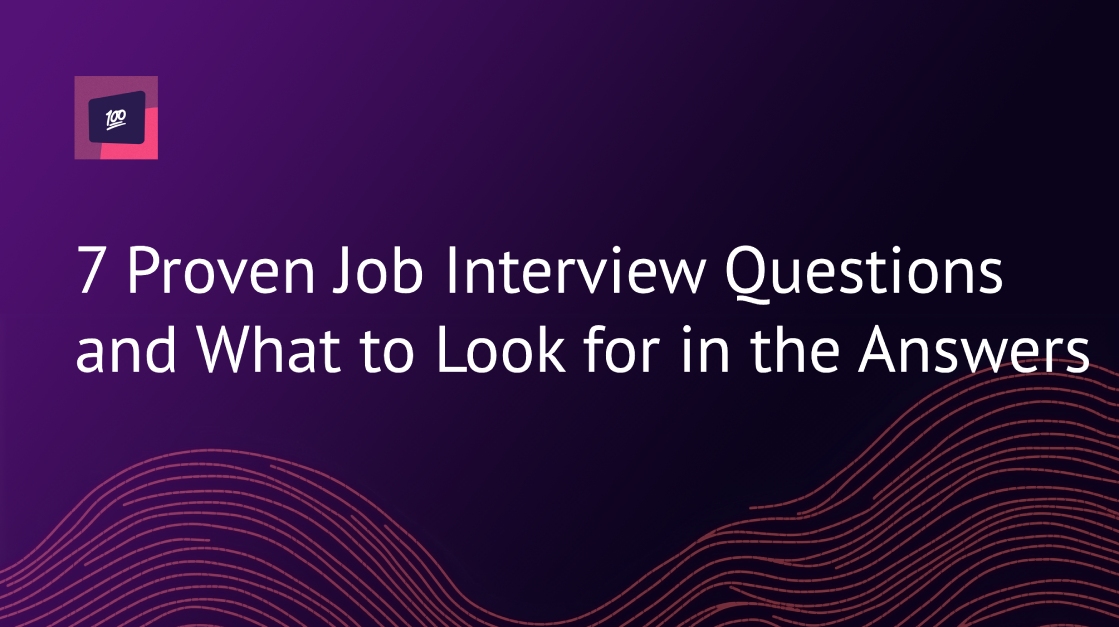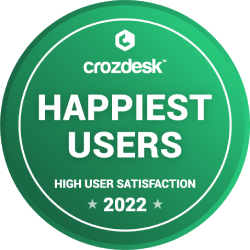7 Proven Job Interview Questions—and What to Look for in the Answers

How do you know when you're talking to a job applicant you should hire?
Start by asking the right interview questions.
the best candidates faster



Good questions are unexpected and thus difficult to script answers for - they’re not just the common interview questions every candidate knows to prepare for - like “tell me about yourself,” “walk me through your resume,” or "why do your want to leave your current company?"
To help hiring managers and human resources determine whether the person sitting across the table will become a top employee, we’re sharing seven insightful job interview questions to work into your interview process.
1. Describe your process for [fill in the blank].
In this question, [fill in the blank] is the job, or a major part of the job you're hiring for. For example, if you’re hiring an email marketer you may ask, “Describe your process for building an email list,” or, “Describe your process for building sender reputation for a new domain.”
This question shows you how your candidate tackles problems that are bound to come up in their day-to-day work. You can also learn more about your applicant's experience when they explain how they approach the keystone tasks of the position.
When it comes to determining whether a candidate is a good fit for the role, Google recruiting leader, Lisa Metrinko, is a fan of this type of interview question. She explains:
“Questions that provoke some sort of thought process… are likely the most effective. They work well because they can give you a sense of how the candidate thinks through a problem.”
Though there are no wrong answers, this question helps you identify any red flags in regards to the candidate's experience. Their understanding of the job might be too rudimentary, for instance. That said, don't fully discount applicants if you think they'll be up to par with a bit of training.
What to look for in an answer
A good answer might go over a typical workday and show some general knowledge of the job, and that's just fine.
A great answer will give you more than that. You might hear something about a candidate's workflow that's especially efficient or clever. Perhaps they know of a faster way to accomplish tasks or check their work, or they tell you about a tool they use that you've never heard of.
You can also spot signs that a new hire will integrate well into your existing team. Perhaps they already use a workflow that's very similar to one the team prefers. If you're lucky, you might even hear ways that this applicant could help the team innovate and improve. When this happens you know you've got a great new hire on your hands.
Variations:
- If I gave you [fill in the blank with an assignment], what would you do first? (ie: If I asked you to build an email list, what would you do first?)
- What's the most important part of getting your job done?
- What is your ideal workflow for [fill in the blank]? (ie: What is your favorite workflow for building email sender reputation?)
2. Tell me about a time you took a risk and failed.
This is Jeff Moore's favorite interview question - Jeff is Head of Staffing for Google’s Consumer Hardware business.
“Everyone has examples of taking a risk and succeeding,” Jeff says. “I want people who are willing to take a risk, knowing that they will not be successful every time. Most importantly, I want to know what they learned from this example that they can take forward and bring to my team.”
Nobody likes to highlight failure, but nobody is perfect, either. This question gives you insight into how an applicant handles missteps and whether they have the humility to admit their mistakes and learn from them.
What to look for in an answer
You want to see the applicant showcase their honesty, instead of trying to spin a negative into a positive. A great candidate will speak candidly about their difficulties and will own their mistakes.
Ideally, they will also talk about what they learned without being pressed. Hiring someone who learns from their mistakes and focuses on constant improvement is key.
Variations:
- How do you handle frustration?
- What's the biggest professional challenge you've faced?
- Can you tell me about a time you overcame a setback?
3. What is an accomplishment you're proud of and why?
A strong team is comprised of people with diverse backgrounds who bring a variety of experiences to the table. But the thing that each team member should have in common is the drive to succeed, and this question will help you identify both that drive and what your candidate considers a success.
It’s great if the applicant wants to talk about an accomplishment that has nothing to do with work. That said, don't get waylaid with personal interview questions that don't tell you anything useful. According to Jeff Moore:
“The worst question I've seen was 'What's your favorite kind of music, and why?' Try to avoid vague questions that have no relevance to the role and don't really add any value to determining cultural fit for the team. Stick to behavioral interview questions that give candidates an opportunity to share experiences relevant to the role.”
Asking what your candidate has achieved gives them a chance to shine, and to show you how they set and accomplish goals.
What to look for in an answer
When you ask this question in a job interview, you want to see your interviewee tell you about something they’ve achieved. What they accomplished is less important than the way that they talk about it. Are they a methodical problem solver, or do they charge into problems head first without a plan?
Their answer can also give you more insight into what this person values and what they want long term, and how those things align with the role. A salesperson who’s proud of quickly paying off their student loans shows thrift and that they’ll understand the value of your customers’ money. A manager who’s proud of their time volunteering at an after-school youth group probably has strong conflict resolution and crisis management skills. Look beyond the accomplishment itself to see what it says about your candidate.
Variations
- What’s your biggest achievement?
- Tell me about your proudest moment.
- Tell me about a time you achieved something you didn’t think you could?
4. What's the most complex or niche thing you know a lot about? can you explain it to me in five minutes or less?
Communication is critical to being effective on a team. That means you need employees who can condense and explain complex ideas clearly, especially on the fly. This is an unusual job interview question, so it's difficult for applicants to rehearse or prepare for it. That means you'll get a more authentic look at how they communicate.
This one question can tell you a lot about your applicant's communication skills and style. It's also a much more effective way to judge communication skills than simply asking an applicant if they’re a good communicator.
What to look for in an answer
Hopefully, when you ask this question, the job candidate will demonstrate passion and excitement in sharing their expertise. But the best answers are about a lot more than excitement. You want to see that the candidate has the ability to concisely summarize and express multilevel ideas without getting bogged down in the details or going off track.
The very best answers will also show strong communication skills, like pausing to ask whether they've explained an idea well enough before moving on to the next idea. A great response will feel more like a conversation than a flood of information or a vague high-level overview.
Variations:
- Your resume says you have experience in [the most complex thing on their resume]. What is [complex thing]?
- How would you describe this job in a 1 - 2 minute elevator pitch to someone who knows nothing about it?
- If you had to explain [a high-level aspect of the job] to a grade-schooler, what would you say?
5. If you join, how will you impact the team?
Asking a question that addresses the value an applicant thinks they would provide can give you useful information about how the hire perceives themselves and their role.
This question helps you find out how they see themselves fitting into your structure and whether they have new ideas to contribute to your team. It's also a much more useful question for job interviews than asking, "Why do you want this job?", as the answer to that question tends to get bogged down with flattery.
“You can use both hypothetical and behavioral type questions, which can help to indicate knowledge of a role as well as thinking through an ambiguous situation,”
says Lisa Metrinko, who recommends questions like these for the ability to catch both specific role information and general problem-solving ability.
What to look for in an answer
You're looking for signs that your candidate did their homework and researched your company - if they do their homework during the job search, they’ll be more likely to do their homework when they work for you. They should know at least some information about what your company does and what goals you're moving toward. The top answers will be specific in explaining how the applicant can contribute to those goals.
A response that indicates that they know their role well is good, but comments that show they're an innovator who's already thinking in the direction your company is going are even better.
Variations:
- What skills do you bring to the table that someone else might not?
- If you get this job, what do you want to achieve first?
- What's something you think you could teach your team here to do better?
6. Tell me about the most unstructured environment you’ve ever worked in.
You want to offer your employees a structured work environment, but you also need to know that you’re hiring confident self-starters. The fastest way to spot a self-starter is to see what someone does when left without instruction.
Rather than throwing your job candidates into a position and watching what they do, you can draw from their previous work experience. This will tell you more about the level of supervision they’re used to, how they liked it, and how they handle being in a self-supporting role.
What to look for in an answer
The answer to this question helps you determine definitions. One person’s vision of “unstructured” might be completely different than someone else’s, so what your applicant says will let you know if they’re prepared for the structure of your open position.
Watch for the interviewee’s reactions. They may show you (or explicitly tell you) that they loved working without structure. Or they may let you know that it isn’t a good fit for them. Different roles call for different levels of oversight, so keep the position in mind to see if an applicant would be a good fit.
If your applicant gets caught up on this question, don't worry. Lisa Metrinko suggests,
“Listen carefully and help guide a candidate if they are going off on a tangent. Candidates are nervous, and it is important to coach a bit if needed as well as make the candidate feel comfortable with the conversation. Lastly, ensure the candidate understands the question.”
Don't hesitate to explain the question if you need to.
Variations:
- Tell me about a period where you were responsible for your own work.
- Tell me about the most and least rigid work environments you’ve had. How did you feel about them?
- How do you handle work when you don’t have a clear assignment?
7. What do you most want me to know about you that we haven’t covered yet?
The interview is a chance to learn more about your candidate, so why not let them put their best qualities on the table?
It seems counterintuitive to let the job candidate tell you what they want you to hear, but this question helps fill in relevant information that doesn't neatly answer your other job interview questions. They may want to reemphasize or explain something they've only mentioned tangentially.
Asking a candidate what they want you to know gives space for them to sell themselves. They may surprise you by telling you something important you didn’t know to ask about.
What to look for in an answer
The best answers to this interview question are unexpected bonuses that don't neatly fit on a resume. A potential new hire for an international franchise might be fluent in two other languages but never mentioned it. A candidate for a sales position may bring up the Etsy side hustle they left out of their work experience. You may get additional depth and color around the candidate's career goals. The pressure to have a one-page resume can lead to relevant experience and other critical information being omitted.
You should also be on the lookout for good examples of “soft” skills. Since many positions, technology jobs in particular, demand so many specialized technical skills, an applicant may not mention experience that isn't directly relevant. But given the choice between two people with similar tech experience, you'd probably prefer the candidate who also has excellent communication and conflict-management abilities as well. This question will help you spot that candidate.
Variations
- What skill makes you most suited to this job?
- Do you have any additional experience that prepares you for this job?
- Why should we hire you and not someone else?
What are your favorite interview questions?
This article was originally posted on the Google Hire blog
the best candidates faster




